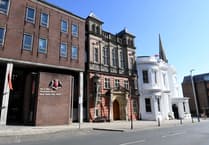Douglas and Peel’s rivals in the race to gain city status have been announced.
Thirty-nine places have applied city status, with the Crown Dependencies in the list for the first time.
The competition is being run as part of the celebrations for the Queen’s 2022 Platinum Jubilee.
Organisers say that winning city status can provide a boost to local communities and open up new opportunities for people who live there. They say economies of previous winners Perth and Preston benefited from their improved national and global standing.
But, short of Douglas town councillors being known as Douglas city councillors and Peel having city commissioners, there will be no immediate differences.
Much bigger towns - such as Bournemouth (population 183,000), Middlesbrough (population 147,000) and Blackburn (population 115,000) - are in the running.
But Douglas (population 26,000) and Peel (population 5,300) are by no means the smallest towns to apply for city status.
Stanley in the Falkland Islands has a population of only 2,148.
Steve Barclay, the Chancellor of the Duchy of Lancaster, a minister in the Westminster government, said: ’City status is not only about local pride, it can deliver real levelling up benefits for businesses and the local area which is clear from the high number of applications. A sincere best of luck to all those who have applied.’
Applicants were asked to talk about the distinct identity and community which they felt meant that their area deserved to become a city, as well as the royal associations of their area.
Unlike previous Civic Honours competitions, a panel will work with ministers to make their recommendations, before being officially approved by the Queen.
The full list:
Alcester, Warwickshire
Ballymena, County Antrim
Bangor, County Down
Blackburn, Lancashire
Bolsover, Derbyshire
Boston, Lincolnshire
Bournemouth, Dorset
Coleraine, County Londonderry
Colchester, Essex
Crawley, West Sussex
Crewe, Cheshire
Doncaster, South Yorkshire
Dorchester, Dorset
Douglas, Isle of Man
Dudley, West Midlands
Dumfries, Dumfries and Galloway
Dunfermline, Fife
Elgin, Moray
George Town, Cayman Islands
Gibraltar, Gibraltar
Goole, East Yorkshire
Greenock, Renfrewshire
Guildford, Surrey
Livingston, West Lothian
Marazion, Cornwall
Medway, Kent
Middlesborough, North Yorkshire
Milton Keynes, Buckinghamshire
Newport and Carisbrooke, Hampshire
Northampton, Northamptonshire
Oban, Argyll and Bute
Reading, Berkshire
Peel, Isle of Man
St Andrews, Fife
Stanley, Falkland Islands
South Ayrshire, Ayrshire and Arran
Warrington, Cheshire
Warwick, Warwickshire
Wrexham, Clwyd
The panel who will decide are: Peter Lee: Director of Constitution at the Cabinet Office; Ben Dean: Director for Sport, Gambling and Ceremonials at the Department of Culture, Media and Sport; Catherine Francis: Director General, Local Government and Public Services at the Department for Levelling Up, Housing and Communities; Laurence Rocky: Director, Office of the Secretary of State for Scotland; Roger Lewis: President of Amgueddfa Cymru (National Museum Wales); Kate Mavor: Chief Executive Officer, Heritage England; Lord Neil Mendoza: Commissioner, Cultural Recovery and Renewal and Kathryn Thomson: Chief Executive Officer, National Museums NI





This article has no comments yet. Be the first to leave a comment.